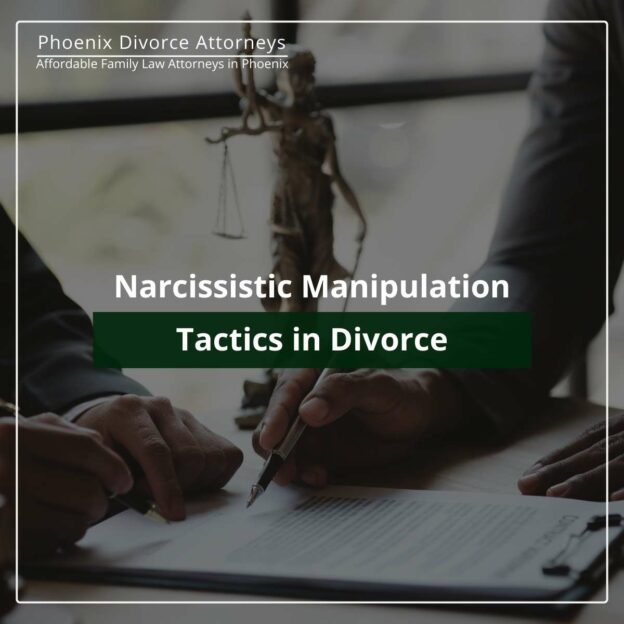Even the most amicable dissolution of marriage is still a stressful experience. But if there is anyone in your life who you suspect is a narcissist (or has been diagnosed with narcissistic personality disorder), you can imagine just how much more difficult that person could make the divorce process. Narcissists thrive on manipulating the people around them, and divorce can present itself as a World Series of manipulation. If you’re getting divorced from a narcissist, you can expect they will attempt at least some manipulation throughout the process. Read on to learn more about the strategies that narcissistic people employ the most. If you’re looking for experienced and knowledgeable divorce representation in the greater Phoenix area, call 602-609-7000 to set up your free consultation with our firm.
What is Narcissism?
Narcissism is also known as narcissistic personality disorder. It is a mental health condition that is marked by a large ego, a need for admiration from others, and a lack of understanding of others. Narcissism is more common in men than in women and usually begins presenting in a person’s late teenage years or early adulthood. People with narcissistic personality disorder have an intense need for attention and will go to great lengths to get it. They often feel superior to the people around them, even if they don’t have achievements that support that feeling of superiority. They may even harbor negative feelings toward people they view as less important. This can also result in narcissists seeking to surround themselves with people who they believe can get them ahead in life. Failure to get what they want can send narcissists into rage and cause aggressive behavior that might not be displayed by someone who doesn’t have a personality disorder. They may have insecurity, shame, and fear about being a failure or being perceived as a failure.
Treating narcissistic personality disorder can be a bit of a Catch-22. The nature of the disorder makes it so that the affected person would not want to admit weakness and seek mental health help. It is also easy for a narcissist to misinterpret a mental health professional’s efforts as insults. However, talk therapy can be effective in helping someone with narcissistic personality disorder deal with their issues. Someone who has been the victim of manipulation and narcissistic abuse should also consider seeking guidance from a mental health professional.
Narcissistic Manipulation That Can Appear in Divorce
Narcissistic personality disorder and manipulating others go hand in hand. It can be expected that a spouse who has this condition may exhibit certain types of behaviors should they ever get divorced. Divorce is already difficult enough without factoring in a personality disorder in at least one party. If you need legal assistance to deal with toxic behavior from an ex during divorce, it will be your responsibility to seek out counsel and retain it yourself rather than the court appointing you an attorney. To schedule your free consultation with our experienced Arizona family law firm, call 602-609-7000.
Making Threats
Threats of violence should be reported and taken seriously, but a narcissist might make other types of threats during a divorce. For example, if the spouses share minor children, a narcissistic spouse might threaten to obtain full custody and never let the other parent see them again. A narcissist might threaten to spread lies or private information to ruin their future ex-spouse’s reputation. There will often be a sense of urgency behind these threats- if you don’t respond within their timeframe, they will act. The problem with responding to these threats consistently is that it will create a precedent and encourage similar behavior in the future. A divorce attorney can help with threats because they can field all communications regarding the divorce and filter out which items require action on your part.
Playing the Victim
There are different subtypes of narcissistic personality disorder, so some narcissists always want to be seen as the winner while others always want to be seen as the victim. For example, covert narcissism is also known as vulnerable narcissism and can have less obvious symptoms than other subtypes of narcissistic personality disorder. There are countless ways that a spouse can play the victim during a divorce. If they weren’t the spouse to file the petition, they would probably repeat that fact over and over again. Arizona is a no-fault divorce state that doesn’t penalize a divorcing spouse for being the petitioner rather than the respondent.
Creating Unnecessary Drama
Drama undeniably draws attention, and narcissists love attention. Getting divorced from a narcissist may feel like unending drama. It might be impossible to get through a divorce with absolutely zero drama, but aiming to keep drama at a minimum reduces stress for both parties. There are a few factors that make divorce drama harder to ignore.
Not every married couple has the option to separate households while a divorce is pending. Some spouses continue to live together during divorce proceedings, whether it’s finances, scheduling, or some other reason. This creates more opportunities for both parties to feel hurt and possibly even take it out on each other.
When a divorcing couple has minor children together, they create both an opportunity to cause drama and an incentive to avoid it. It can be emotionally damaging for children to watch their parents fight and argue. If you do feel the need to fight and argue with your ex, keep it away from places like your children’s school and custody exchanges.
Drawing Out Proceedings
Stalling a divorce to make it take longer is a move in the narcissist’s playbook. There could be several motivations behind this. If one spouse has an easier time paying legal fees, delaying a divorce may be their way of trying to “starve out” their spouse. That spouse might simply want to maintain an obligation and control over their spouse. If a spouse is intentionally delaying a divorce, the affected spouse may need to work harder to make sure the divorce is finalized efficiently. Hiring a family law attorney can help keep negotiations on track to reduce how long the divorce takes. However, every divorce in Arizona is bound by a mandatory 60-day waiting period. Divorce can take much longer- several months or even years. Ideally, a divorce attorney will keep the matter from taking that long through careful and persistent legal work.
Recruit Representation That Will Help Protect Your Interests
A divorce with at least one narcissist involved is bound to be more complicated and stressful than the average divorce case. Proceeding through a divorce without legal representation can be overwhelming, and doing so when your ex does have an attorney will put you at a disadvantage. It can take more than one consultation to find the attorney who best suits your needs- that’s why Phoenix Divorce Attorneys offers our initial phone consultations free of charge, unlike some of our competitors. Learn more about your options under Arizona law with no risk or obligation. Our patient and knowledgeable divorce lawyers will get your case started on the right foot. Schedule your free consultation today, call 602-609-7000.
My AZ Lawyers
Office: (480) 833-8000
Phoenix Family Law Office
668 N. 44th St., Ste 320
Phoenix, AZ 85008
Scottsdale Family Law Office
7135 E. Camelback Rd, Ste 230
Scottsdale, AZ 85251
Avondale Family Law Office
12725 W. Indian School Rd, Ste E-101
Avondale, AZ 85392
Mesa Family Law Office
1731 W. Baseline Rd., Ste 100
Mesa, AZ 85202
Glendale Family Law Office
20325 N. 51st Ave., Ste 134
Glendale, AZ 85308


